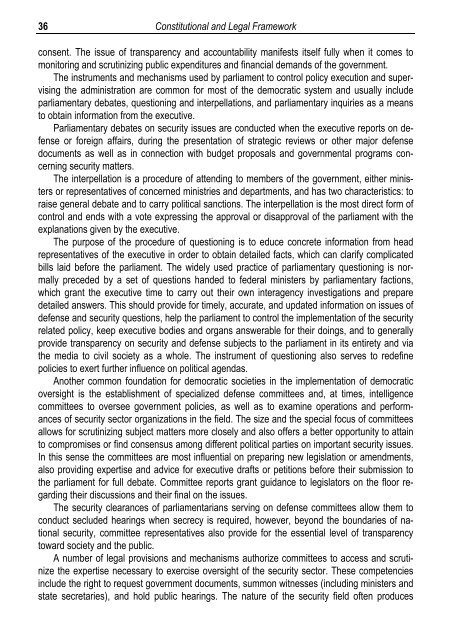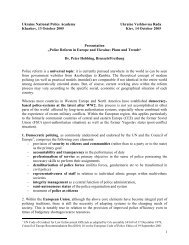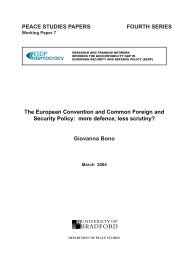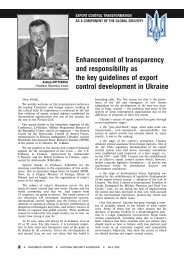Civil-Military Relations and Democratic Control of the Security Sector
Civil-Military Relations and Democratic Control of the Security Sector
Civil-Military Relations and Democratic Control of the Security Sector
Create successful ePaper yourself
Turn your PDF publications into a flip-book with our unique Google optimized e-Paper software.
36<br />
Constitutional <strong>and</strong> Legal Framework<br />
consent. The issue <strong>of</strong> transparency <strong>and</strong> accountability manifests itself fully when it comes to<br />
monitoring <strong>and</strong> scrutinizing public expenditures <strong>and</strong> financial dem<strong>and</strong>s <strong>of</strong> <strong>the</strong> government.<br />
The instruments <strong>and</strong> mechanisms used by parliament to control policy execution <strong>and</strong> supervising<br />
<strong>the</strong> administration are common for most <strong>of</strong> <strong>the</strong> democratic system <strong>and</strong> usually include<br />
parliamentary debates, questioning <strong>and</strong> interpellations, <strong>and</strong> parliamentary inquiries as a means<br />
to obtain information from <strong>the</strong> executive.<br />
Parliamentary debates on security issues are conducted when <strong>the</strong> executive reports on defense<br />
or foreign affairs, during <strong>the</strong> presentation <strong>of</strong> strategic reviews or o<strong>the</strong>r major defense<br />
documents as well as in connection with budget proposals <strong>and</strong> governmental programs concerning<br />
security matters.<br />
The interpellation is a procedure <strong>of</strong> attending to members <strong>of</strong> <strong>the</strong> government, ei<strong>the</strong>r ministers<br />
or representatives <strong>of</strong> concerned ministries <strong>and</strong> departments, <strong>and</strong> has two characteristics: to<br />
raise general debate <strong>and</strong> to carry political sanctions. The interpellation is <strong>the</strong> most direct form <strong>of</strong><br />
control <strong>and</strong> ends with a vote expressing <strong>the</strong> approval or disapproval <strong>of</strong> <strong>the</strong> parliament with <strong>the</strong><br />
explanations given by <strong>the</strong> executive.<br />
The purpose <strong>of</strong> <strong>the</strong> procedure <strong>of</strong> questioning is to educe concrete information from head<br />
representatives <strong>of</strong> <strong>the</strong> executive in order to obtain detailed facts, which can clarify complicated<br />
bills laid before <strong>the</strong> parliament. The widely used practice <strong>of</strong> parliamentary questioning is normally<br />
preceded by a set <strong>of</strong> questions h<strong>and</strong>ed to federal ministers by parliamentary factions,<br />
which grant <strong>the</strong> executive time to carry out <strong>the</strong>ir own interagency investigations <strong>and</strong> prepare<br />
detailed answers. This should provide for timely, accurate, <strong>and</strong> updated information on issues <strong>of</strong><br />
defense <strong>and</strong> security questions, help <strong>the</strong> parliament to control <strong>the</strong> implementation <strong>of</strong> <strong>the</strong> security<br />
related policy, keep executive bodies <strong>and</strong> organs answerable for <strong>the</strong>ir doings, <strong>and</strong> to generally<br />
provide transparency on security <strong>and</strong> defense subjects to <strong>the</strong> parliament in its entirety <strong>and</strong> via<br />
<strong>the</strong> media to civil society as a whole. The instrument <strong>of</strong> questioning also serves to redefine<br />
policies to exert fur<strong>the</strong>r influence on political agendas.<br />
Ano<strong>the</strong>r common foundation for democratic societies in <strong>the</strong> implementation <strong>of</strong> democratic<br />
oversight is <strong>the</strong> establishment <strong>of</strong> specialized defense committees <strong>and</strong>, at times, intelligence<br />
committees to oversee government policies, as well as to examine operations <strong>and</strong> performances<br />
<strong>of</strong> security sector organizations in <strong>the</strong> field. The size <strong>and</strong> <strong>the</strong> special focus <strong>of</strong> committees<br />
allows for scrutinizing subject matters more closely <strong>and</strong> also <strong>of</strong>fers a better opportunity to attain<br />
to compromises or find consensus among different political parties on important security issues.<br />
In this sense <strong>the</strong> committees are most influential on preparing new legislation or amendments,<br />
also providing expertise <strong>and</strong> advice for executive drafts or petitions before <strong>the</strong>ir submission to<br />
<strong>the</strong> parliament for full debate. Committee reports grant guidance to legislators on <strong>the</strong> floor regarding<br />
<strong>the</strong>ir discussions <strong>and</strong> <strong>the</strong>ir final on <strong>the</strong> issues.<br />
The security clearances <strong>of</strong> parliamentarians serving on defense committees allow <strong>the</strong>m to<br />
conduct secluded hearings when secrecy is required, however, beyond <strong>the</strong> boundaries <strong>of</strong> national<br />
security, committee representatives also provide for <strong>the</strong> essential level <strong>of</strong> transparency<br />
toward society <strong>and</strong> <strong>the</strong> public.<br />
A number <strong>of</strong> legal provisions <strong>and</strong> mechanisms authorize committees to access <strong>and</strong> scrutinize<br />
<strong>the</strong> expertise necessary to exercise oversight <strong>of</strong> <strong>the</strong> security sector. These competencies<br />
include <strong>the</strong> right to request government documents, summon witnesses (including ministers <strong>and</strong><br />
state secretaries), <strong>and</strong> hold public hearings. The nature <strong>of</strong> <strong>the</strong> security field <strong>of</strong>ten produces

















